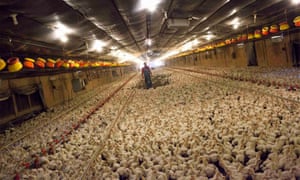Food
"The world produces enough grain to keep every person alive at a subsistence level and it produces enough grain plus vegetables, fruits, fish, and meat raised on grass rather than grain to provide a healthy diet to every person (Kimbrell 2002, 7; Meados et al. 2004,57). The shortages result from unequal distribution."
Local markets are also unequally distributed, location wise. In many developing countries, the people there have no transportation. Also, there are no good quality roads to transport the goods to these food deserts. Transportation routes are expensive and requires public funding and public maintenance. Extreme climate and geographic variance make this an issue that needs to be solved locally, pertaining to the area's situation. Robertson makes the point that even though grain is used to feed the animals for sustenance, grass-fed animals are sufficient and we can use the grain to actually feed people. I thin a lot of people in developed countries believe that in order to feed everyone, those who have access to food have to give up some of the availability.
"Involving learners in growing their own food fosters understanding of the larger, living world and their connection to it."
The education element of this is what intrigues me. There is a lot to learn if we want to sustain ourselves rather than relying on the methods that got us here in the first place. Although I do not have land to grow my own garden of food and various plants, I know there are available places around me. there is a local market on campus every Wednesday. This is a direct connection to the soil that grows what I put into my body. I am hesitant to grow my own garden as a main source of food, but I will consider growing my own garden for vegetables that I would otherwise purchase at the local Walmart. I hear the flavor of growing fresh tomatoes are far superior to that in the store. Also, knowing that if there is ever a food-borne illness, it does not affect those who are growing their own food.
"Animals in feedlots suffer emotional stress from living conditions and physical stress from being forced to eat monotonous diets of corn or feed pellets, which their systems have not evolved to digest."
Over 95%of farm animals in the U.S. are raised in factory farms, according to aspca.org. The amount is staggering especially is you take into account the cruelty practices. Animal welfare is not a priority for many people. I admit to having supported farm factories. Directly, by the power of my money, I have supported this abuse. If it isn't enough for someone to find out the alarming details of factory farming, perhaps they need to know how harmful it is to us. Factory farming impacts our health, the environment, and family owned farms. The reason for all of these food-borne illnesses are the unnatural, inhumane conditions. Salmonella, E. coli, and others are to be feared because of the unsanitary conditions. Not to mention, the waste that is on a large-scale pollutes.
Robertson, M. (2017). Sustainability principles and practice. London: Routledge, Taylor & Francis Group.
Local markets are also unequally distributed, location wise. In many developing countries, the people there have no transportation. Also, there are no good quality roads to transport the goods to these food deserts. Transportation routes are expensive and requires public funding and public maintenance. Extreme climate and geographic variance make this an issue that needs to be solved locally, pertaining to the area's situation. Robertson makes the point that even though grain is used to feed the animals for sustenance, grass-fed animals are sufficient and we can use the grain to actually feed people. I thin a lot of people in developed countries believe that in order to feed everyone, those who have access to food have to give up some of the availability.
 |
| http://suitlandroadcoc.org/2016/09/28/free-food-distribution-at-oxon-hill-church-of-christ-9282016/ |
"Involving learners in growing their own food fosters understanding of the larger, living world and their connection to it."
The education element of this is what intrigues me. There is a lot to learn if we want to sustain ourselves rather than relying on the methods that got us here in the first place. Although I do not have land to grow my own garden of food and various plants, I know there are available places around me. there is a local market on campus every Wednesday. This is a direct connection to the soil that grows what I put into my body. I am hesitant to grow my own garden as a main source of food, but I will consider growing my own garden for vegetables that I would otherwise purchase at the local Walmart. I hear the flavor of growing fresh tomatoes are far superior to that in the store. Also, knowing that if there is ever a food-borne illness, it does not affect those who are growing their own food.
 |
| https://www.greenmylife.in/growing-your-own-food/ |
Over 95%of farm animals in the U.S. are raised in factory farms, according to aspca.org. The amount is staggering especially is you take into account the cruelty practices. Animal welfare is not a priority for many people. I admit to having supported farm factories. Directly, by the power of my money, I have supported this abuse. If it isn't enough for someone to find out the alarming details of factory farming, perhaps they need to know how harmful it is to us. Factory farming impacts our health, the environment, and family owned farms. The reason for all of these food-borne illnesses are the unnatural, inhumane conditions. Salmonella, E. coli, and others are to be feared because of the unsanitary conditions. Not to mention, the waste that is on a large-scale pollutes.
 |
| https://www.theguardian.com/sustainable-business/2016/mar/03/factory-farming-divestment-explain Resources |
Comments
Post a Comment